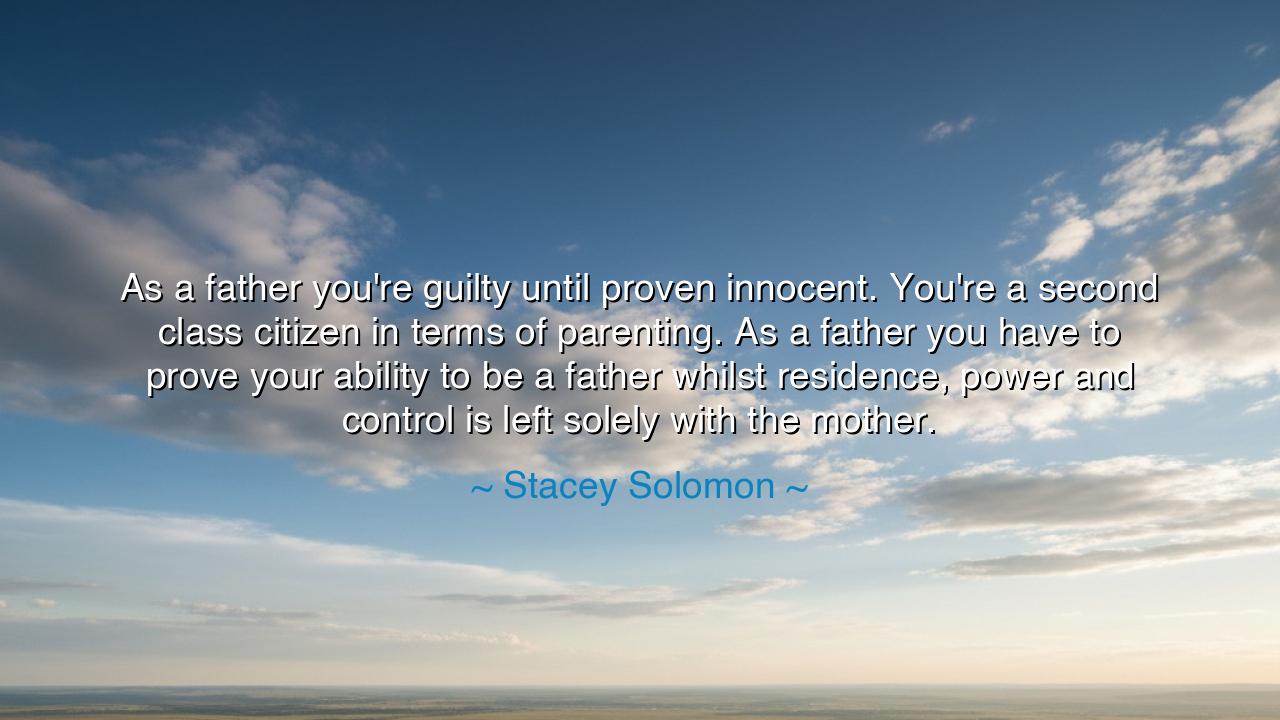
As a father you're guilty until proven innocent. You're a second
As a father you're guilty until proven innocent. You're a second class citizen in terms of parenting. As a father you have to prove your ability to be a father whilst residence, power and control is left solely with the mother.






In the voice of sorrow and defiance, Stacey Solomon spoke words that strike like thunder across the ancient valleys of family life: “As a father you’re guilty until proven innocent. You’re a second-class citizen in terms of parenting. As a father you have to prove your ability to be a father whilst residence, power and control is left solely with the mother.” This saying is not born of malice, but of truth observed, of wounds endured in silence. It speaks of the struggle of fathers, who in the realm of parenting are often judged not by their love, but by suspicion, treated not as equals, but as shadows beside the radiant image of motherhood.
For in many lands, the mother is crowned with unquestioned authority, while the father must constantly justify his role. Though his heart may be steadfast, though his arms may hold with tenderness, still he is asked to prove, to demonstrate, to battle for legitimacy. The words of Solomon echo the pain of many men who love their children yet feel the heavy hand of doubt upon them. It is as if the bond between father and child must be earned through trial, while the mother’s bond is assumed, unquestioned, inviolate.
This truth is not new. In the tales of old, the warrior Hector of Troy, though noble and courageous, was remembered chiefly as soldier and defender, not as father to his son Astyanax. His image was bound to battle, while Andromache, his wife, was remembered as the nurturer. Yet the poets who sang his story preserved one tender moment: Hector removing his helmet so as not to frighten his son, embracing the child with love before returning to war. That moment reveals what Solomon cries out in her words: that fathers have always been more than providers and warriors, yet their tenderness is too often unseen, doubted, or diminished by society’s gaze.
The origin of Solomon’s lament lies in the struggles of modern law, custom, and perception. Courts have long favored the mother in matters of custody and residence, often reducing the father’s role to visitor, not guardian. Even within the walls of the home, many men feel their judgment questioned, their care undervalued. They may rise at night to soothe the child, labor by day to provide, guide with patience and gentleness — yet still they must prove their worth, while mothers are granted trust by birthright. This imbalance creates not only wounded men, but also children deprived of seeing the full strength and compassion that fatherhood can offer.
The lesson, then, is twofold. To fathers, take courage. Though the path is harder, though suspicion weighs upon you, let your actions be your testimony. Let your steadfastness, your patience, and your visible love for your children speak louder than any accusation. Walk not in bitterness but in strength, for your perseverance will carve a place of honor in your child’s memory, even if the world denies it. To society, open your eyes: to honor motherhood does not require diminishing fatherhood. The family is strongest when both voices, both hearts, both hands are valued as one.
Practical actions must be taken: fathers, remain present and unyielding in your devotion, even when unseen. Mothers, invite partnership, not possession, in the raising of your children. Communities and lawmakers must strive toward balance, ensuring that the measure of a parent is not their gender, but their love and commitment. In homes, let respect flow equally between mother and father, for children who witness equality learn harmony, but children who witness division carry scars of imbalance.
So let Solomon’s words echo as both lament and prophecy. For if we fail to respect the role of fathers, we rob children of half their heritage, half their guidance, half their love. But if we honor fathers equally, we strengthen the very pillars of family itself. Pass down this teaching: that the power of parenting does not belong to mother or father alone, but to both in unity. And let future generations remember that no parent should walk as a second-class citizen in the sacred calling of raising a child.






AAdministratorAdministrator
Welcome, honored guests. Please leave a comment, we will respond soon